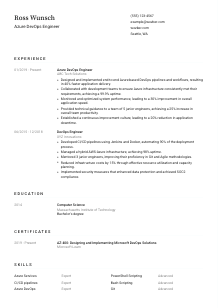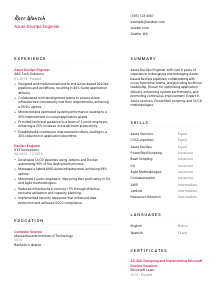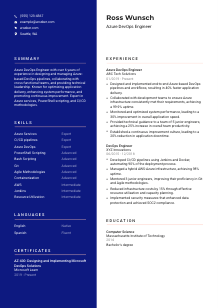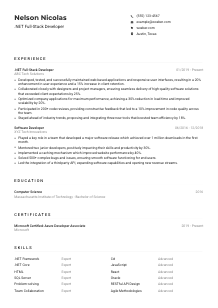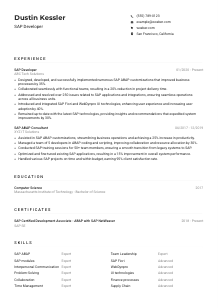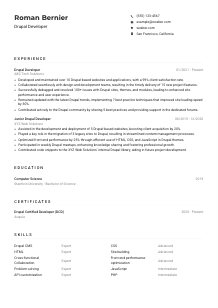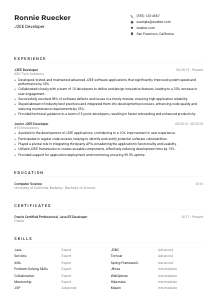Azure DevOps Engineer Resume Example
Navigating cloud infrastructures, but feel like your resume is in a merge conflict? Dive into this Azure DevOps Engineer resume example, crafted with Wozber free resume builder. Grasp how you can pipeline your infrastructure expertise to align with job expectations, making sure your career deploys without any rollbacks!
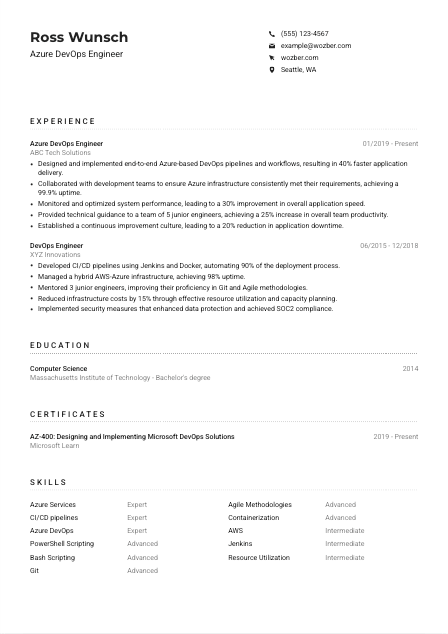
How to write an Azure DevOps Engineer resume?
Hey there, aspiring Azure DevOps Engineer! Preparing to step into the spotlight of the Azure universe? Your resume isn't just a document; it's your gateway to amazing opportunities. It showcases your journey, expertise, and the unique value you bring. In the realm of Azure DevOps, where precision and innovation are key, your resume needs to reflect these qualities impeccably.
Leveraging the power of the Wozber free resume builder, this comprehensive guide walks you through tailoring your resume to highlight your strengths in alignment with your dream Azure DevOps Engineer role. Ready to turbocharge your career trajectory? Let's dive in and transform your resume into a ticket to your next big adventure!
Personal Details
First impressions matter, especially in the competitive world of Azure DevOps. Your personal detail section is more than an introduction; it's your resume's handshake with potential employers. Here's how you can ensure it's firm, confident, and perfectly aligned with what they're seeking for an Azure DevOps Engineer.
1. Highlight Your Name
Imagine your name in lights - that's the visual impact you want! Use a clear font, perhaps a tad larger than the body text to ensure it catches the eye instantly. Your name is not just a label; it's the marque of your professional brand.
2. Match the Job Title
Immediately below your name, present the title 'Azure DevOps Engineer.' This strategic placement ties your identity to the role at first glance, signaling to hiring managers that their search might be over before they've even dived into the specifics of your experiences.
3. Essential Contact Info
In the world of DevOps, details matter. Make sure your phone number is your most reliable one, and your email address should scream professionalism. A pro tip? Use a combination of your first and last name in your email, steering clear of any quirky nicknames or numbers that date back to high school.
4. Geolocation Advantage
"Must be located in Seattle, WA." This line from the job description is your cue. If you're local, saying so directly in your resume places you a step ahead, easing any concerns about relocation delays or availability.
5. Professional Online Presence
Including a URL to your LinkedIn profile or a personal website where your projects are showcased can be a game-changer. Ensure these platforms are up-to-date and echo the narrative of your resume. This is your chance to show, not just tell, what you're capable of in the Azure DevOps sphere.
Takeaway
Think of the Personal Details section as the open door to your professional world. Get these basics right, and you invite the hiring manager to step in and get to know you better. Remember, in every detail, accuracy and alignment with the job requirements are key. Your resume is starting to take shape!





Experience
The Experience section of your resume is where you really shine. It's your time to showcase how your journey aligns perfectly with the heart of being an Azure DevOps Engineer. Let's ensure your past roles stand as a testament to your capabilities and directly answer the call of the job requirements.
- Designed and implemented end‑to‑end Azure‑based DevOps pipelines and workflows, resulting in 40% faster application delivery.
- Collaborated with development teams to ensure Azure infrastructure consistently met their requirements, achieving a 99.9% uptime.
- Monitored and optimized system performance, leading to a 30% improvement in overall application speed.
- Provided technical guidance to a team of 5 junior engineers, achieving a 25% increase in overall team productivity.
- Established a continuous improvement culture, leading to a 20% reduction in application downtime.
- Developed CI/CD pipelines using Jenkins and Docker, automating 90% of the deployment process.
- Managed a hybrid AWS‑Azure infrastructure, achieving 98% uptime.
- Mentored 3 junior engineers, improving their proficiency in Git and Agile methodologies.
- Reduced infrastructure costs by 15% through effective resource utilization and capacity planning.
- Implemented security measures that enhanced data protection and achieved SOC2 compliance.
1. Unpack the Job Description
Take a magnifying glass to the job description. Notice how it asks for a "Minimum of 4 years of experience" or "Design, implement, and manage end-to-end Azure-based DevOps pipelines"? These are your keywords and phrases. Your goal? Match your accomplishments to these requirements.
2. Logical Structure
Starting with your most recent role, lay out your professional timeline. For each position, include the job title, company name, and the period of employment. This chronological format is not just ATS-friendly; it tells a coherent story of your growth and how it's led you to this point.
3. Achievement Spotlight
For each role, articulate your achievements that reflect the job requirements. When you mention, "Designed and implemented end-to-end Azure-based DevOps pipelines," you're not only ticking a box from the job description but setting the stage to go deeper during an interview. Be ready to discuss!
4. The Power of Numbers
Nothing speaks louder than quantifiable successes. A "40% faster application delivery" or "a 99.9% uptime" not only proves your capabilities but does so in a language that businesses understand. Numbers cut through the noise and highlight your impact vividly.
5. Relevance is Key
Admirable as your diverse interests might be, your resume isn't the place for them. Focus solely on experiences that forge a clear, unbroken path to becoming an Azure DevOps Engineer. If you can, weave in how your roles have prepared you for the specific tasks outlined in the job description.
Takeaway
Your Experience section is a narrative of your professional evolution, each role a chapter that's brought you closer to your goals. Crafted correctly, it tells hiring managers not just where you've been, but where you're headed and how their company fits into your journey. Let's make your story compelling!
Education
While technical skills and hands-on experience take the front seat in an Azure DevOps Engineer's journey, a solid educational background sets the stage for lifelong learning and adaptation. Here's how you can ensure your Education section supports your aspirations effectively.
1. The Degree Requirement
"Bachelor's degree in Computer Science, Information Technology, or equivalent practical experience." If your degree aligns with one of these fields, highlight it prominently. Your education shows not just knowledge, but a foundational understanding of the principles behind your practice.
2. Keep It Streamlined
This section should be a beacon, not a fog. List your degree, the institution, and your graduation year. A clean, straightforward format ensures the focus remains on how your education aligns with the role's requirements.
3. Showcase the Match
If your degree title mirrors the job's educational request perfectly, make sure it stands out. For roles like Azure DevOps Engineer, the technical rigor and relevance of your degree can speak volumes even before your experience does.
4. Additional Credentials
While the degree is paramount, for those at the early stages of their career, relevant coursework, projects, or honors can add depth. This said, focus on elements that build your case as an Azure DevOps Engineer—like courses in cloud computing or certifications that complement your degree.
5. Honors and Extracurriculars
If you've received honors or participated in relevant extracurricular activities, briefly mention them. However, their impact lessens with more seasoned professionals, so weigh their inclusion based on the depth of your other experiences.
Takeaway
Your Education section lays the groundwork, showcasing your dedication and readiness to dive deep into the Azure DevOps realm. Tailored correctly, it reinforces your readiness to tackle the complexities of the role, ensuring your resume strikes the perfect chord from the get-go.
Certificates
In the fast-evolving field of Azure DevOps, staying updated with the latest certifications is not just an advantage; it's a necessity. Here's how to make your certificates section shine, underscoring your commitment to continuous learning and expertise in the field.
1. Align with Job Essentials
Your eye should catch the "Azure certification such as AZ-400: Designing and Implementing Microsoft DevOps Solutions is highly desired" in the job description. If you have it, list it prominently. This directly aligns your qualifications with their desires, making your application stand out.
2. Quality Over Quantity
While you might be tempted to list all your certifications, focus on the ones most relevant to Azure DevOps. This targeted approach ensures the hiring manager sees the certifications that matter most, at first glance.
3. Up-to-date Achievements
If your certifications are recent or have expiration dates, make note. This showcases not only your current competencies but also your dedication to keeping your skills sharp in an ever-changing technological landscape.
4. Continuous Growth
The tech field is dynamic, and so should be your learning curve. Regularly updating your certifications and pursuing new ones, especially those that enhance your azure DevOps capabilities, signals a proactive attitude and a hunger for growth.
Takeaway
The right certifications can dramatically elevate your resume, spotlighting your specialization and cutting-edge knowledge in Azure DevOps. Treat this section as your professional badge of honor that speaks to your commitment and readiness to excel in complex cloud environments.
Skills
The Skills section of your resume is more than a list; it's a curated display of your professional toolkit. For an Azure DevOps Engineer, this includes a blend of technical prowess and soft skills that underpin successful projects. Here's how to craft a Skills section that resonates.
1. Analyze the Job Requirements
First, extract both the explicit and implicit skills mentioned. For the Azure DevOps Engineer position, it's clear: "Strong proficiency in scripting with PowerShell and/or Bash," "In-depth understanding of CI/CD pipelines," and more. These are your guideposts.
2. Highlight Matching Skills
List skills that directly align with the job description, and make sure to cover both hard skills like "Azure DevOps," "CI/CD pipelines," "PowerShell Scripting," and soft skills such as problem-solving and teamwork. This shows you're not just technically capable but also a well-rounded team player.
3. Order and Organization
While it might be tempting to list every skill you possess, focus on the ones most relevant to the job. Order them from most to least relevant, ensuring the hiring manager's eye catches the most critical skills first. This laser-focused list will make a stronger impact.
Takeaway
Your Skills section is the crest that signals your readiness to tackle the challenges of the Azure DevOps Engineer role head-on. By highlighting the skills that directly intersect with the job requirements, you're not just applying, you're answering a call. Let's make it clear you're the hero they need.
Languages
In our globalized world, the ability to communicate across linguistic barriers can be a significant asset, especially in collaborative and diverse workspaces like Azure DevOps. Here's how to effectively display your language skills to enhance your desirability for the role.
1. Meeting the Basic Requirements
The job description explicitly states: "English speaking and comprehension skills required." If English is your forte, list it prominently as 'Native' or 'Fluent.' This immediately reassures employers of your ability to communicate effectively in the workplace.
2. Value-Adding Languages
Besides the mandatory English, if you are proficient in other languages, list them too. This could set you apart, especially if the role involves collaborating with global teams. Your multilingual skills hint at a broader cultural understanding and adaptability.
3. Honest Proficiency Ratings
Be transparent and honest about your language proficiency levels. Use terms like 'Native,' 'Fluent,' 'Intermediate,' and 'Basic.' This clarity helps set expectations and shows your integrity.
4. The Bigger Picture
While the primary focus is on the languages required for the job, your ability to communicate in additional languages showcases versatility. It's a subtle nod to your potential in fostering smoother interactions and bridging communication gaps in multinational teams.
5. Leveraging Language in Your Role
Consider how your language skills can be an asset in your role as an Azure DevOps Engineer. Whether it's collaborating on international projects or assisting in the global deployment of services, each language you speak is a doorway to broader horizons and opportunities.
Takeaway
Your languages section is more than a list; it's a statement of your ability to thrive in a connected world. For an Azure DevOps Engineer, this could mean the ability to work seamlessly across borders, adding yet another layer of value to your professional profile. Let your linguistic skills shine!
Summary
Your resume summary should do more than just summarize; it needs to grab attention, pique interest, and invite further reading. For an aspiring Azure DevOps Engineer, this is where your narrative begins. Let's craft a summary that encapsulates your professional essence while mirroring the job requirements.
1. Capturing the Role's Essence
Start by internalizing the essence of the Azure DevOps Engineer position. Understand what makes it tick—the blend of technical expertise and the ability to foster seamless development and operational processes.
2. Your Professional Introduction
Open with a strong statement that introduces you as a professional. "Azure DevOps Engineer with over 6 years of experience" not only defines your identity but also establishes your credibility right off the bat.
3. Highlighting Your Match
Dig into your skillset and accomplishments, choosing highlights that directly address the job's requirements. Phrases like "optimizing application delivery" and "enhancing system performance" don't just tick boxes; they resonate with the heart of what an Azure DevOps Engineer does.
4. Brevity is Your Friend
Aim for a summary that's sharp and to the point. Remember, this is just the teaser, setting the stage for the detailed narrative that follows in your resume. Three to five lines should suffice to make a memorable impact.
Takeaway
Consider the summary section your professional prelude, setting the tone for the narrative that unfolds. Crafted meticulously, it beckons the hiring manager to read on, eager to discover how your story aligns with their needs. The stage is set; now, let the rest of your resume bring the house down.
Embarking on Your Azure DevOps Engineer Journey
Congratulations on fine-tuning your resume with precision and care! Equipped with insights from this guide, you're ready to present a resume that doesn't just trace your path but illuminates your future as an Azure DevOps Engineer. Leveraging the Wozber free resume builder, including its ATS-friendly resume templates and ATS resume scanner, you've wielded the tools to ensure your resume is not only a reflection of your potential but also a beacon for your next big opportunity. The blueprint is in your hands; let your skills, experience, and passion for Azure DevOps lead you forward.
The domain awaits your expertise. Dare to make your mark!

- Bachelor's degree in Computer Science, Information Technology, or equivalent practical experience.
- Minimum of 4 years of experience as a DevOps Engineer with a focus on Azure services.
- Strong proficiency in scripting with PowerShell and/or Bash.
- In-depth understanding of CI/CD pipelines using Azure DevOps or equivalent tooling.
- Azure certification such as AZ-400: Designing and Implementing Microsoft DevOps Solutions is highly desired.
- English speaking and comprehension skills required.
- Must be located in Seattle, WA.
- Design, implement, and manage end-to-end Azure-based DevOps pipelines and workflows.
- Collaborate with development teams to ensure Azure infrastructure meets their requirements and remains scalable, reliable, and secure.
- Monitor system performance, implement security measures, and regularly perform system maintenance tasks.
- Provide technical guidance and mentoring to junior team members, promoting best practices and knowledge sharing.
- Work closely with cross-functional teams to ensure smooth application delivery and continuous improvement.





